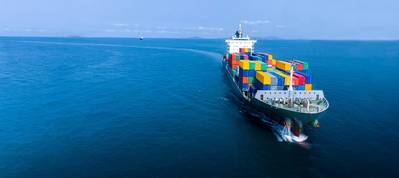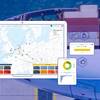Iridium's GMDSS Service Goes Live
Satellite communications provider Iridium Communications Inc. announced Tuesday that its Global Maritime Distress and Safety System (GMDSS) service officially went live on Friday, December 11, ending a monopoly held by rival Inmarsat and enhancing the integrity of global safety communications for seafarers globally.
GMDSS is an internationally regulated service, governed by the International Maritime Organization's (IMO) Safety of Life at Sea (SOLAS) convention. It provides life-saving assistance to seafarers in distress and has required equipment on board more than 60,000 ships today, with many ships carrying multiple terminals. Iridium's service functions much like an international SOS button, however, unlike other options it includes as standard real-time emergency voice calling service, distress alert (SOS button) and maritime safety information with Iridium's global coverage.
"This is a historic moment in both the satellite and maritime industries," said Matt Desch, CEO of Iridium. "It is not every day that you get to announce the launch of a service that will most certainly save lives and is bringing innovation to this important maritime service."
Iridium's GMDSS service is built on the company's upgraded $3 billion satellite network, completed in 2019, and utilizes the company's L-band satellite spectrum. This spectrum serves as a weather-resilient complement to other satellite broadband capabilities on ships, aircraft and vehicles and is also a requirement for GMDSS terminals on SOLAS-class vessels.
The first terminal available is the Lars Thrane LT-3100S, which can be used for both primary and emergency ship communications, and combines distress alert, distress voice and maritime safety information (MSI). The combination of all three services in one terminal is a first for the industry and one that makes the GMDSS even more accessible to smaller vessels that may not otherwise be able to afford the equipment, Iridium said.
Here's how it works: Once a vessel holds down the red 'distress' button, indicating that it needs assistance, a signal is immediately routed through the Iridium satellite network and delivered in moments to a designated Rescue Coordination Center (RCC). Unique to the Iridium system, this is then followed automatically by a distress phone call, allowing the vessel to immediately speak with the RCC. The RCC then can quickly understand the nature of the emergency, while also alerting nearby vessels and local search and rescue authorities to provide the required immediate assistance.
Approval process and testing
Iridium started the process to become a GMDSS service provider in 2013 and had to meet several objectives before formally ending a monopoly on the provision of the satellite-based portion of maritime distress services that had been held by Inmarsat since the system became operational in 1999. It is expected that additional GMDSS service providers will go live in the years ahead.
After being recognized by the IMO's Maritime Safety Committee to provide GMDSS service, Iridium has worked closely with its regulator, International Mobile Satellite Organization (IMSO), to meet all conditions required for service introduction. Aside from technical integrations around the world, this has included the signing of a Public Services Agreement with IMSO in April of 2019, which details the conditions for IMSO to act as regulator and maintain oversight of Iridium's GMDSS services and a Letter of Compliance in December 2019 stating that Iridium was authorized to begin providing service when ready.
Captain Moin Ahmed, Director General of IMSO, regulator of the GMDSS system, said, "Overall, our formal evaluation of Iridium took more than four years, and at each step Iridium successfully demonstrated that its Safety Voice, Distress Alert and Iridium SafetyCastSM maritime environment broadcasts not only met all IMO requirements but in many cases exceeded them."
Desch said, "When we started this process, there was no process. No company had ever tried to do what we have now achieved. In partnership with the IMO, U.S. Coast Guard and IMSO, a system to allow for Iridium to provide GMDSS service had to be invented."
"Developing and qualifying a GMDSS system was extremely challenging, so we didn't want to just do the minimum or what has been done before. We wanted to make our system more accessible, affordable and feature-rich," Desch said.
Master Mariner and Senior Marine Specialist for Maersk Captain Brian Soberg Petersen shared his experience as part of the testing process: "At Maersk, we have been very satisfied with the capabilities of the Iridium system and are presently analyzing our future communications plans, where we believe Iridium GMDSS could serve an additional function as a backup data connection as well, in lieu of our existing system."
Speaking from the Rescue Coordination Center perspective, Watch Leader and Senior Search and Rescue Officer for RCC New Zealand Dave Wilson spoke toward their experience with the new system: "Having played a significant role in the developmental testing of the Iridium GMDSS, both from shore-to-ship and the ship-to-shore pathways, this new system is the type of technological advancement that will enhance GMDSS. Our team at the Rescue Coordination Center of New Zealand, and the crew of the New Zealand research vessel that has been assisting with the testing, have been very impressed with the Iridium GMDSS system."














